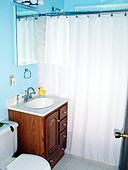Bathtub or Shower: What's Best for You?
 Will a bathtub or shower work better in your home? The answer is simple: there is no clear-cut answer. Both types of bathing facilities have numerous advantages and disadvantages, which vary according to your stage in life and your family status. What's more, bath or shower installation cost will depend on the type of fixture you've selected, as well as the expense of debris removal if the job is a replacement of an old bath or shower.
Will a bathtub or shower work better in your home? The answer is simple: there is no clear-cut answer. Both types of bathing facilities have numerous advantages and disadvantages, which vary according to your stage in life and your family status. What's more, bath or shower installation cost will depend on the type of fixture you've selected, as well as the expense of debris removal if the job is a replacement of an old bath or shower.
Shower Options
Homeowners in their senior years or with limited mobility tend to favor stall showers over baths, to avoid having to climb in and out of a steep-sided, slippery tub. However, curbless shower installation, the most practical method to ensure wheelchair or walker access, requires careful handling to avoid drainage problems; you'll definitely need to hire a reliable, licensed plumber.
Tiled shower stalls with a curb are sturdy and often very attractive, as well as more affordable than the curbless type. There are hundreds of gorgeous tile designs to choose from in a wide variety of sizes, colors, and textures.
The least expensive option is a fiberglass or acrylic kit, which makes it easy to install the shower yourself. These are difficult to keep clean, though, and shower replacement pieces can be hard to obtain.
Tub Options
Many folks like the luxury of a quiet, contemplative soak in a tub. Bathtubs are also much more convenient for bathing children and pets.
Built-in bathtubs have long been popular for their space-saving properties. They are also easy to combine with a wall-mounted showerhead. However, elegant freestanding tubs are gaining in popularity as "statement" bathroom fixtures. If you're a dedicated bath fan, consider installing a freestanding bathtub to add zest to your bathroom, whether it's a nostalgic claw foot style or a thoroughly modern resin model.
Water Usage
Although the capacity of a standard bathtub is 42 gallons, that's not allowing for water displacement by the human body. In actual practice, a bath tends to take closer to 30 gallons. Compare that to a typical 10-minute shower, which uses 25 gallons of water. With a low-flow showerhead, that amount is reduced to 20 gallons. When you shorten your time under the spray or temporarily turn off while you lather up or shave, you can decrease your water usage even more, making the shower much more water efficient.
However, with the current trend toward lavish spa-like showers that feature separate his-and-hers adjustable towers, installing a shower may have the opposite effect, actually increasing your water consumption. If this is likely to be the case, you should consider upgrading to a bigger water heater and larger capacity water lines to handle the load.
Home Resale Value
Real estate brokers report that most househunters want at least one tub in the home hey eventually purchase. Shower installation -- if you have only one bathroom -- tends to limit the number of potential buyers and keep your home on the market longer. That being said, the buyer pool for your community will make a difference. If yours is an area that appeals to young families, a bathtub is a necessity. If the community is heavily weighted toward retired adults, having a tub is less important. Check comparable local properties to make sure you're competitive.
Do you have two or more bathrooms? Then you can afford to compromise by replacing one bathtub with a shower. The best place for this is usually in the master bath.
Alternatively, aging in place may be your prime concern. In this case, ensure that you have at least one bedroom and a bathroom with a universally accessible shower installed on the ground floor.
Laura Firszt writes for networx.com.
Updated June 17, 2018.
Looking for a Pro? Call us (866) 441-6648

Plumbing Average Costs
Plumbers Experiences

Thoroughly Modern Bathroom Remodel

Cast Iron Bathtub Replacement Was Definitely Not A DIY Project



